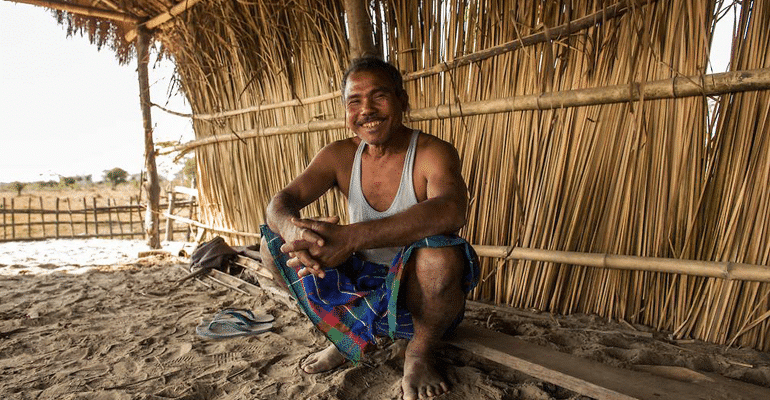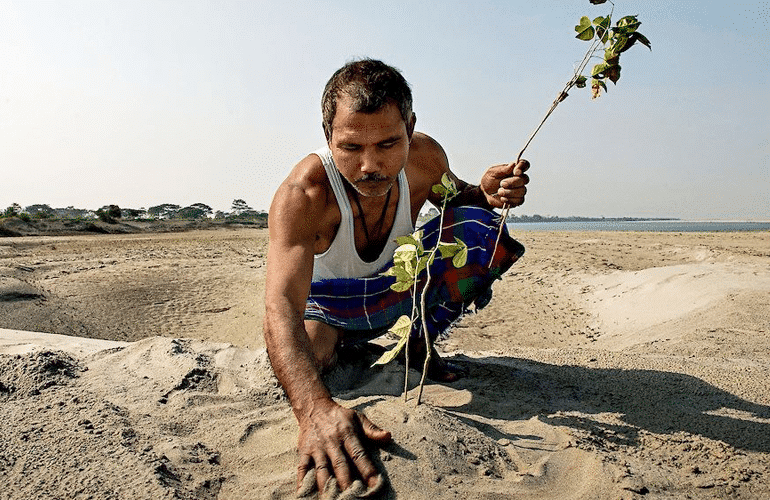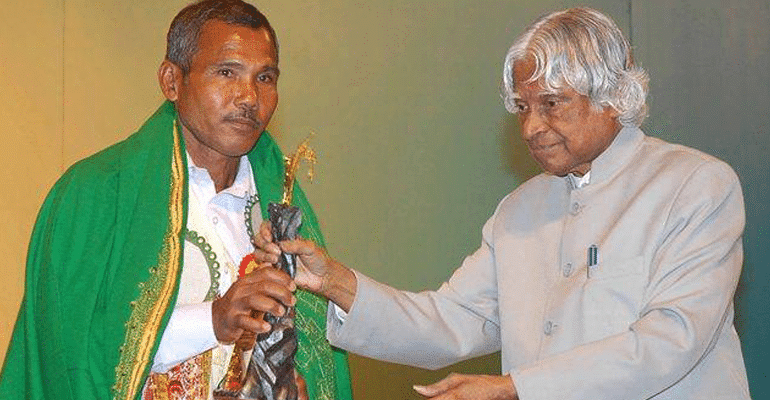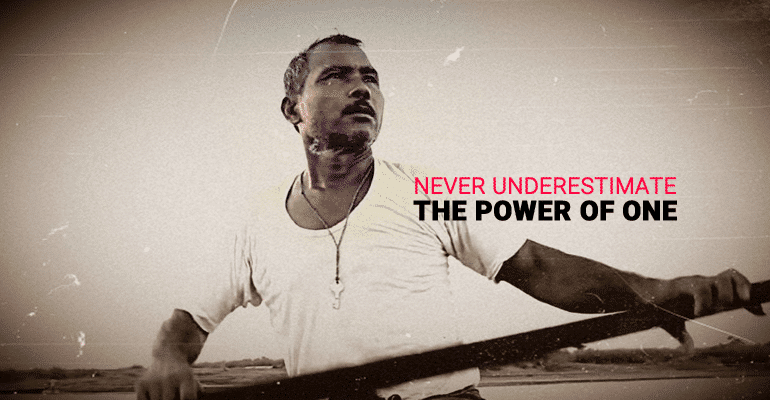The unfiltered rugged forest of river island Majuli in North-East India’s Assam district now blooms with a lush green forest and wildlife. And it is also home to an incredible individual the world has ever seen- the Forest Man of India. Years of sacrifice, grit, and determination of this man has created an entire 1,360-acre forest in Assam, changing the landscape of the state forever.
In a heart-warming telephonic conversation, Life Beyond Numbers spoke to Jadav “Molai” Payeng, a tribal farmer in Assam who is no less than a resuscitator of Earth and is so humble to the core that he is still unaware of his superlative feat.

If you have the pleasure to talk to him, you will guess in no time that the whole forest is like a family to him, whom he has given birth to and nurtured for years like his own children. “When somebody tells me that they will cut a tree, I tell them to kill me first instead,” says the die-hard nature lover. “I want the plants to be valued and believe that the world is big enough for everybody to live and grow,” says Payeng.
The genesis of one extraordinary journey
While many people across the world are skeptical about palm reading, in Payeng’s case, the prophecy did come true. When he was a child, a man looked at his palm and said that the course of his life will gravitate towards Nature.
Payeng, who was born to a poor buffalo farmer, is the third among the 13 siblings. But when the 1965 flood destroyed Aruna Sapori, a river island on the Brahmaputra, which happens to be Payeng’s native land; his family had no other option but to move out of the area and go to Majuli, the other side of the river.
Due to extreme poverty and before parting, Payeng’s parents left the 5-year-old child in Anil Borthakur’s care, who was a court-master at the District Judge Court in Jorhat. This man took charge of Payeng’s schooling since then.
“I just completed my class X exams from Baligaon Jagannath Baruah Arya Vidyalaya in Jorhat and returned to my native land in the April of 1979,” recalls Payeng. “I came across hundreds of lifeless snakes twisted and curled up against each other on the deserted sandbar because there was no tree cover. This incident sent chills down my spine and my immediate thought that hit me was what would happen if this happens to us, humans?” he narrates to LBN.
When the heartbroken and disturbed boy went to the nearby Deori community village, the villagers gave him the ancient native wisdom of the villagers and that was the beginning of Payeng’s extraordinary journey in the scorching summer of the same year- armed with 50 seeds, 25 bamboo plants and a staunch belief that this is what he was always destined to do.
41 years back, he had sown life in the form of a plant and today there stands a green lush cover instead of a barren wasteland.
Bamboos, Teak, Banyan, Gulmohar, Mango, Tamarind, Mango, Gambhari, Mulberry, Peach, Sugar-apple, star fruit- you name it. There are numerous medicinal plants as well. The list is endless and yet Payeng still knows all the names by heart.
The riverbanks of Brahmaputra is home to over 250 Mishing tribe families who have inhabited this place for eons. Today, the locals call it ‘Molai’ forest, which is Jadav’s nickname.
The Resuscitator of Earth
Payeng was 39 when he married 25-year-old Binita and now has 3 children- Munmuni, Sanjiv and Sanjay. Understanding the opportunities that come with education, 8 years back in 2011, he shifted his family to Eklong Mising village, Kokilamukh, Jorhat.

Payeng inherited the livestock left by his deceased parents and now he has hundreds of cows, from which he makes his living by selling milk.
So what Payeng’s daily routine looks like? Well, when millennials go to bed, it is time for Payeng to wake up- at 3 am. His daily travel to the forest is almost like a beautiful ritual and it is his family who helps him in the process.
This self-motivated person doesn’t lack inspiration or enthusiasm to do something good for nature. At dawn, he cycles for an hour to Kartik Sapori, then for about 5 km rows a boat, cycles again for 30 minutes to reach his cowshed.
On reaching cowshed, he collects the cow dung, wipes the floor, feeds the cows and milks them. While all the dung becomes manure and goes into fertilizing the forest, the milk becomes ready for sale. A quick breakfast and Payeng walks into his jungle.
Payeng, who believes for every problem, nature has a solution, asks “Where did the ancient wisdom of India go?” Adding to this he says, “We had great men born on this soil, who sacrificed their lives for the betterment of this country and now everyone is leaving India and going to foreign countries. How do you expect this country to prosper when best minds are going away?”
Talking to him, you can almost smell the effort, the hard work and dedication that has gone into creating this forest. “A forest doesn’t weep over one tree but we should, because soon there will be none left. It is a gift from the soil and we all must understand that” he says.
Creating Woodland in Island
Payeng’s life changed when Jitu Kalita, a Johrat based wildlife photographer, and a journalist discovered his tireless effort to save nature and published a story on him in the Assamese newspaper The Dainik Janambhumi in 2010. Till today, Payeng considers him as his mentor and friend who guided him in the darkest of circumstances.
In the years that followed, Payeng gained recognition worldwide and in 2015, the former late President APJ Abdul Kalam bestowed him with Padma Sri Award and prize money in Mumbai, which he gladly used for the welfare of the villagers in the area.
He also became one of the 900 experts to gather at the seventh global conference of the International Forum for Sustainable Development at Evian in France. Further, the Sanctuary Asia gave him the Wildlife Service Award for his extraordinary contribution to nature.
The forest which has become denser now due to the seeds dispersed by winds is also home to deer, snakes, vultures, pelicans, several migratory birds, wild boars, elephants, royal Bengal tigers, and monkeys. Even animals from the Kaziranga forest visits his jungle.
Not only birds and animals of over 120 species visit his forest but it attracts 1000s of journalists, volunteers and students from all over the world.
Payeng’s Plea
The forest cover is decreasing because of human population and animals are getting affected by that. “People have problems when an elephants ravage their homes, destroy their crops or when a monkey enters a hut; but what are we doing for these animals?” asks Payeng.
Even after numerous requests to the forest department and the state government of Assam, sharing the ideas of how the soil erosion can be prevented, the officials have turned blind eye to his endless appeals. “I don’t want awards and recognition for doing something that is the responsibility of every human being. I suggested that coconut trees will be helpful in preventing erosion because they are tall, straight and the roots are strong as well. If we plant them in a systematic way and close to each other, the maximum problem of this area will be solved. In 10 years, 2000 hectares can be covered,” believes Payeng.
Currently, Payeng is sowing seeds of plants that will become food for elephants in years to come. On asking about the donation the self-styled naturalist says, “I work for India, not Assam, it is not my forest only, it is everyone’s forest. Whatever we have taken back from nature, we have to give it to her.”
If you want to help him, you can leave a message on his Facebook page.
Payeng refuses to see the Earth in any other color apart from Green. Recognition and awards matter very little to this man for whom all the trees now give a standing ovation, thanking him for giving them life.



